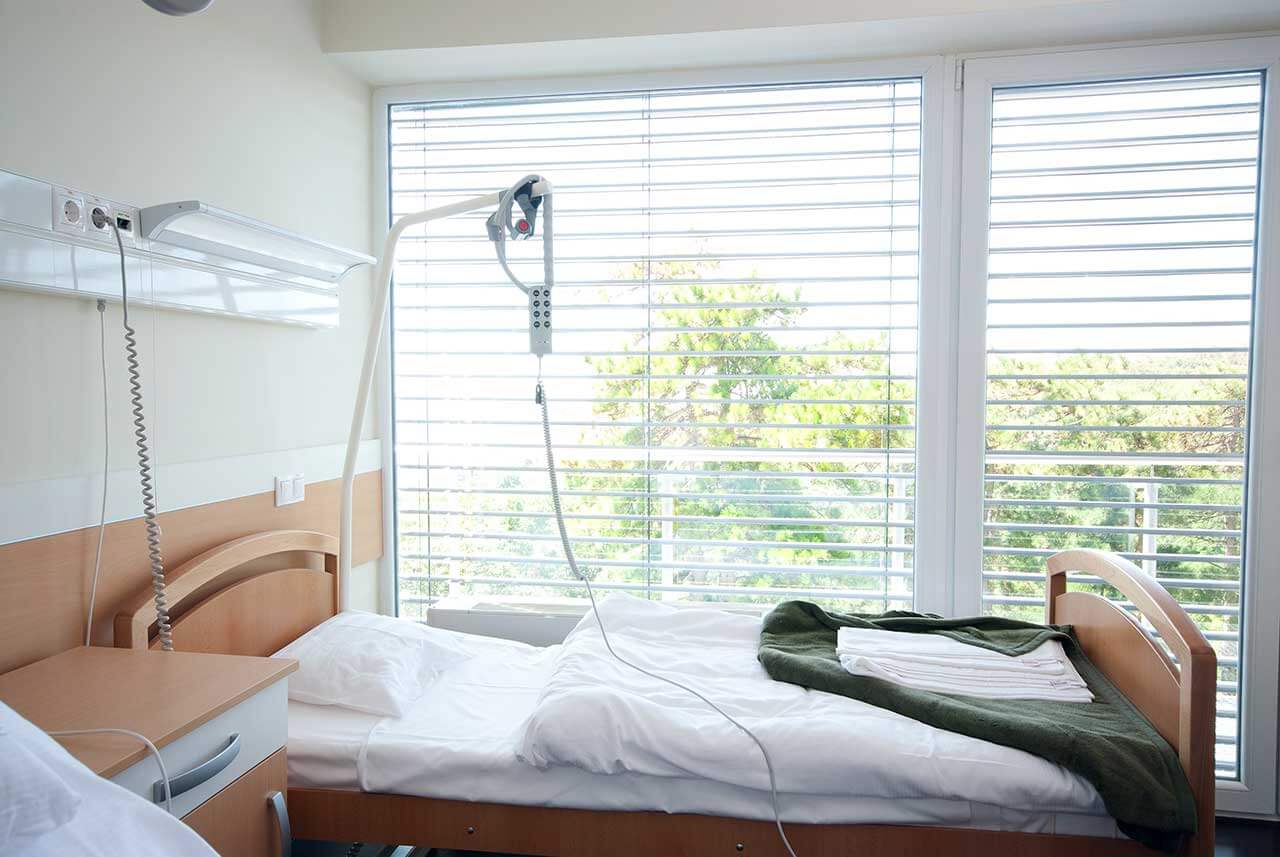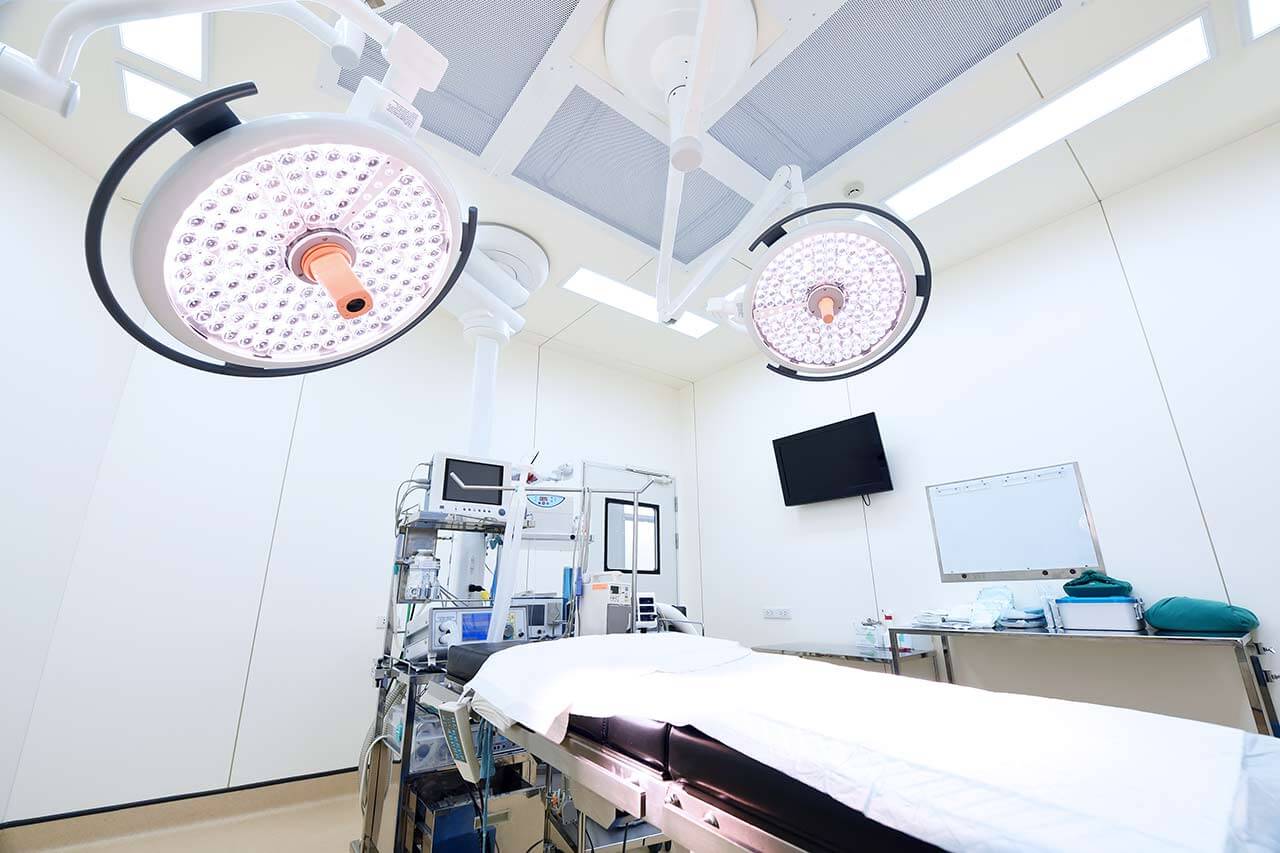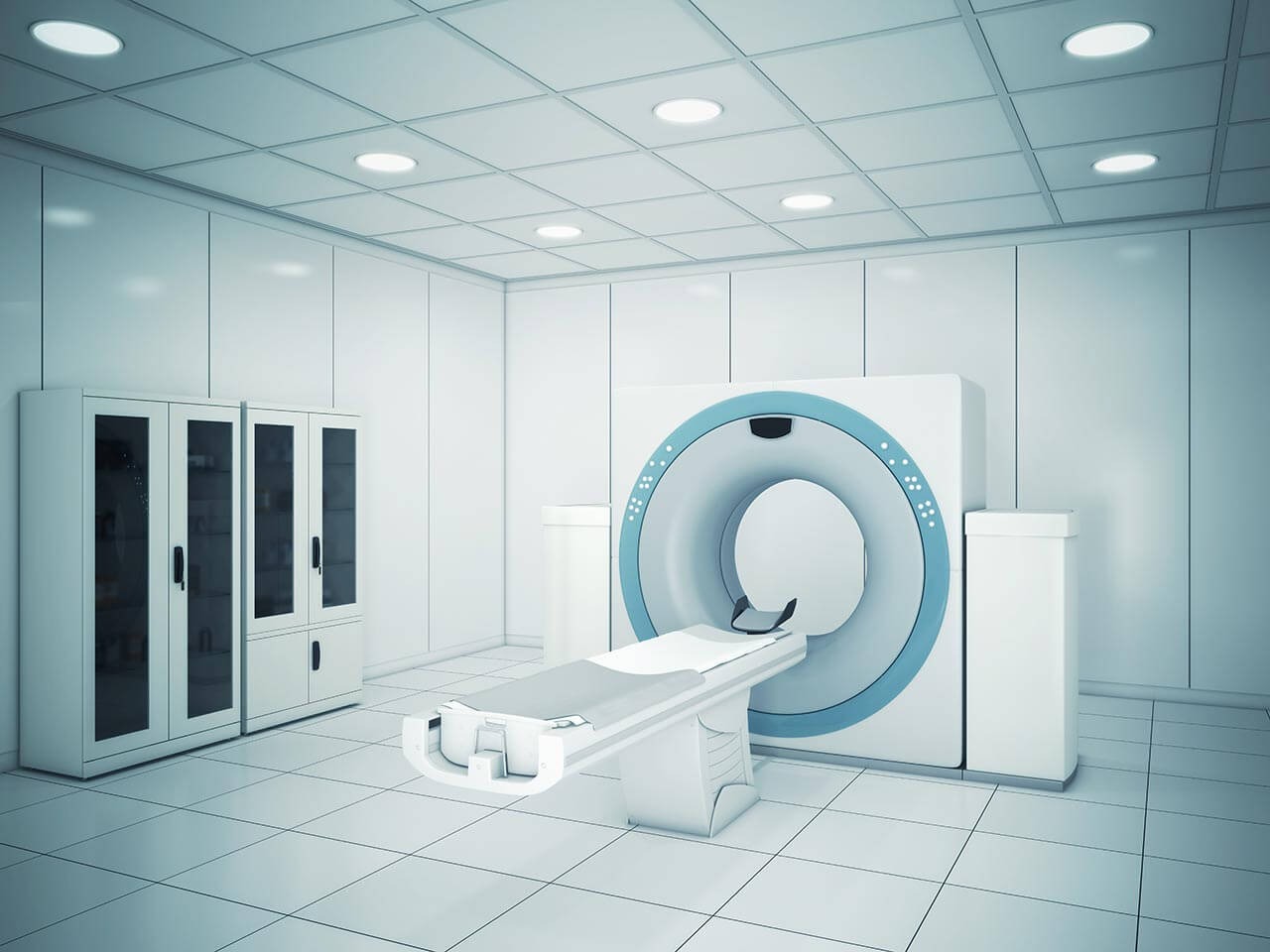
The program includes:
- Initial presentation in the clinic
- clinical history taking
- review of medical records
- physical examination
- urological examination
- laboratory tests:
- complete blood count
- general urine analysis
- biochemical analysis of blood
- inflammation indicators (CRP, ESR)
- indicators blood coagulation
- ultrasound pelvic/ rectal
- urethrocystoscopy
- fistulography
- preoperative care
- ыurgical closure of the vesicoenteric fistula
- symptomatic treatment
- control examinations
- the cost of essential medicines and materials
- nursing services
- full hospital accommodation
- explanation of future recommendations
Required documents
- Medical records
- Abdominal and pelvic ultrasound (if available)
- Cystoscopy/colonoscopy (if available)
Service
You may also book:
 BookingHealth Price from:
BookingHealth Price from:
About the department
The Department of Adult and Pediatric Urology at the Marienhaus Hospital St. Elisabeth Neuwied offers the full range of high-precision diagnostics and effective treatment for women and men with kidney and urinary tract diseases, as well as for men with diseases of the reproductive system. The medical facility also treats children with pathologies of the kidneys, bladder, and ureters, as well as boys with malformations of the reproductive system. The department's team of urologists cooperates closely with radiology specialists, thanks to which patients can undergo all necessary imaging tests. In-house advanced laboratories are also available here for laboratory diagnostics. The key areas of the department's specialization include surgical treatment of tumors of the kidney, bladder, prostate, and external genitalia in men, minimally traumatic treatment of kidney stone disease, and conservative and surgical treatment of urinary incontinence in women, men, and children. Since 2019, the department's surgeons have been using a modern robot-assisted da Vinci®X surgical system, which ensures the most sparing surgical interventions and significantly lowers the risk of postoperative complications. Some minor interventions are performed on an outpatient basis, for example, repair of undescended testicles and surgery for inguinal hernias in children. The department's specialists are deservedly proud of their high treatment success rates, and the entire medical team is focused on personalized patient care. The Head Physician of the department is Prof. Dr. med. Carsten Maik Naumann.
The department's urologists have vast experience in prostate cancer treatment. This oncological disease is the most common among men, so the doctors at the medical facility are constantly introducing the very latest treatment methods into clinical practice, which allow them to cure even advanced cancers. Treatment tactics depend on the tumor size, cancer stage, the patient's age, and the patient's general health condition. The department's doctors have all the necessary diagnostic options, including imaging tests and biopsy procedures. It is worth noting that in 2022, the department received a state-of-the-art micro-ultrasound system for diagnosing prostate tumors, which allows obtaining high-resolution images of excellent quality. If doctors confirm the presence of a malignant tumor in a patient, the department's specialists proceed to develop a personalized treatment regimen. The first-line therapeutic measure for most patients is a surgical intervention. The department's urologists always give preference to minimally invasive techniques, and with appropriate clinical indications, they give priority to da Vinci robot-assisted surgery. Both before and after surgery, conservative methods such as chemotherapy, radiation therapy, targeted therapy, hormone therapy, and immunotherapy may be used.
Special attention deserves the use of the da Vinci®X surgical system in the department, which was introduced here in 2019. It is this type of surgical treatment that is today recognized as the most progressive, sparing, highly accurate, and, at the same time, highly effective. The department's specialists use the da Vinci®X surgical system to remove prostate, bladder, and kidney tumors. The operating principle of daVinci®X is based on the execution of commands given in real time by a specially trained surgeon, which the robotic device implements with the help of four manipulator arms with built-in miniature instruments and a camera. The surgeon fully controls the entire course of the operation using the da Vinci control panel, so spontaneous manipulations of the surgical system are excluded. The range of motion of the robotic arms is many times greater than the functionality of the human wrist, which allows the doctor to approach all anatomical structures virtually without damaging healthy tissues. Robot-assisted surgery also eliminates human factors, such as hand tremors. The daVinci®X surgical system is expensive equipment that is available only in the world's most progressive medical centers.
The department regularly admits patients with kidney stone disease. The specialists at the medical facility have deep knowledge of the diagnostics of kidney stone disease and use modern methods and technologies in their work to accurately determine the size, composition, and localization of concrements in the kidneys and bladder. These include ultrasound and X-ray methods, computed tomography, and advanced laboratory diagnostics. The department's doctors apply a comprehensive approach to the treatment of kidney stone disease. In the early stages, the department's specialists use only an individually elaborated drug therapy regimen and diet correction, while the advanced stages of the pathological process require the application of interventional methods for stone fragmentation. Patients with kidney stone disease mostly undergo endoscopic procedures such as percutaneous nephrolithopaxy and ureterorenoscopy. The department's specialists also pay due attention to the prevention of kidney stone disease, which aims to take measures to prevent the possible formation of stones in patients predisposed to this condition.
An important role in the department's clinical practice is given to the treatment of urinary incontinence in women, men, and children. The team of the department's doctors specializes in conservative and surgical treatment of the pathology. The first-line treatment is conservative therapy that includes drug therapy, individual exercise programs to strengthen the pelvic floor muscles, biofeedback, electrical stimulation, and therapy with pessaries. Only if the above-mentioned therapeutic procedures fail do doctors make a decision to perform surgery. As for the surgical methods, the department's urologists perform TVT and TVT-O sling procedures, vaginosacropexy, and Burch colposuspension.
The department's main clinical focuses include:
- Minimally invasive and da Vinci robot-assisted surgery for urologic cancers
- Radical prostatectomy with regional lymph node removal in cases of prostate cancer
- Kidney tumor resection: radical nephrectomy and organ preservation surgery
- Radical cystectomy with the creation of a new urinary diversion pathway
- Testicular resection with regional lymph node removal
- Adrenalectomy
- Surgical treatment of penile cancer, including lymph node removal surgery
- Laparoscopic surgery
- Lymph node resection
- Kidney cyst removal surgery
- Varicocele surgery
- Endoscopic surgery
- Urethral dilation for strictures
- Transurethral resection of the prostate for benign prostatic hyperplasia
- Transurethral resection of bladder tumors
- Bladder stone fragmentation using percutaneous nephrolitholapaxy and ureterorenoscopy
- Ureteral dilation for stenosis, including ureteral stent implantation
- Puncture sclerotherapy for kidney cysts
- Minimally invasive surgery for urinary incontinence
- TVT and TVT-O sling procedures
- Vaginosacropexy
- Burch colposuspension
- Minimally invasive surgery for pediatric urologic diseases
- Phimosis surgery
- Inguinal hernia repair surgery
- Cryptorchidism surgery
- Ectopic ureteral orifice surgery
- Ureteral stricture surgery
- Comprehensive treatment of nocturnal urinary incontinence (enuresis)
- Other medical services
Curriculum vitae
Medical Activities
- Since 2019 Head Physician, Department of Adult and Pediatric Urology, Marienhaus Hospital St. Elisabeth Neuwied.
- 2009 - 2018 Senior Physician, Department of Adult and Pediatric Urology, University Hospital Schleswig-Holstein, Kiel Campus; Head of the Section for Urologic Oncology and Research Center.
- 2009 Senior Physician, Department of Adult and Pediatric Urology, University Hospital Schleswig-Holstein, Kiel Campus.
- 2003 - 2009 Assistant Physician, Department of Adult and Pediatric Urology, University Hospital Schleswig-Holstein, Kiel Campus.
- 2002 - 2003 Internship, Department of General, Abdominal and Thoracic Surgery, University Hospital Hamburg-Eppendorf.
Other Professional Activities
- Instructor of the "German Training Program for Robot-Assisted Surgery in Urology" of the German Society for Robot-Assisted Urology and of the Working Group on Laparoscopy and Robot-Assisted Surgery of the German Society of Urology.
- Visiting Professor at surgical seminars and training courses on genitourinary prosthetic repair.
- Coordinator, responsible for quality management and documentation of the Prostate Cancer Center at the Cancer Center of the University Hospital Schleswig-Holstein, Kiel Campus.
Clinical Interests
- Surgery for urologic oncology and tumor drug therapy.
- Robot-assisted, laparoscopic, and retroperitoneoscopic tumor surgery.
- Urologic reconstructive plastic surgery and specialized lymph node surgery.
- Treatment of urinary incontinence in men.
Additional Qualifications
- Additional qualification in andrology.
- Additional qualification in tumor drug therapy.
- Theoretical foundations of the specialty in radiation protection in the field of interventional radiology.
- Theoretical foundations of the specialty in radiation protection in the field of X-ray diagnostics of the urinary system and male reproductive system.
- Theoretical foundations of the specialty in radiation protection in the fields of chest X-ray and emergency X-ray diagnostics.
- Theoretical foundations of the specialty in the field of sentinel lymph node diagnostics.
- Advanced training in basic psychosomatic care.
Photo of the doctor: (c) Marienhaus Kliniken GmbH
About hospital
The Marienhaus Hospital St. Elisabeth Neuwied is an advanced health facility with an excellent reputation in the national medical arena. It is the largest medical complex in the state of Rhineland-Palatinate. The Marienhaus Hospital St. Elisabeth Neuwied is an academic hospital of Johannes Gutenberg University Mainz and an academic hospital of Maastricht University in the Netherlands. The status of an academic hospital provides access to the very latest achievements of European medicine in diagnostics and treatment. The health of patients is in the safe hands of a highly qualified team of doctors and nursing staff. The specialists make every effort to provide each patient with the most effective and personalized care in comfortable conditions.
The hospital has 11 specialized departments, as well as day clinics, outpatient clinics, and specialized centers. Clinical practice offers such medical fields as general surgery, abdominal surgery, vascular surgery, gynecology, obstetrics, radiology, gastroenterology, diabetology, cardiology, trauma surgery, urology, spinal surgery, and pediatric and adolescent medicine.
The hospital has 429 beds for an inpatient hospital stay. The health facility admits about 19,000 inpatients and more than 35,000 outpatients annually. The hospital's specialists provide comprehensive and high-quality medical care focused on meeting the specific needs and wishes of each patient.
The hospital implemented an effective quality control system corresponding to ISO 9001 standards more than 15 years ago. The purpose of this system is to provide continuous and patient-oriented monitoring of medical and administrative processes.
Many departments in the hospital have been awarded prestigious quality certificates, including a certificate from the German Cancer Society (DKG) for the treatment of breast and gynecological cancers, a certificate from the German Cardiac Society (DGK) for the treatment of acute coronary syndrome, an EndoCert certificate for joint replacement surgery, a certificate from the German Society of Vascular Surgery (DGG), and others.
Photo: (с) depositphotos
Accommodation in hospital
Patients rooms
The patients of the Marienhaus Hospital St. Elisabeth Neuwied live in single or double rooms. All patient rooms are comfortable and designed in light colors. Each patient room has an ensuite bathroom with a shower and a toilet. The patient room furnishings include an automatically adjustable bed, a bedside table, a table and chairs for receiving visitors, a wardrobe for storing personal belongings, a telephone, and a TV. Wi-Fi access is also available throughout the hospital. Most patient rooms in the hospital have large panoramic windows, offering a beautiful view.
If desired, patients can live in enhanced-comfort rooms. Such rooms are more spacious, and they are additionally equipped with a mini-fridge, a safe, and upholstered furniture. The bathroom has a hairdryer, a cosmetic mirror, towels, a bathrobe, and toiletries.
Meals and Menus
The patients of the hospital are offered three tasty meals a day: breakfast, lunch, and dinner. There is a choice of several lunch menu options every day. Breakfast and dinner are served buffet-style, allowing patients to choose meals independently. The menu also includes daily options for dietary and vegetarian meals. Individual menus are provided for patients as well, if necessary.
The patients staying in enhanced-comfort rooms are offered tea, coffee, and juices, as well as fresh fruits and snacks, in addition to a varied three meals a day.
The hospital also houses a cozy cafe. The menu includes complex breakfasts and lunches, salads, snacks, desserts, and hot and cold drinks.
Further details
Standard rooms include:
Accompanying person
The accompanying person may stay with you in the patient room or at the hotel of your choice during the inpatient program.
Hotel
You may stay at the hotel of your choice during the outpatient program. Our manager will help you choose the best option.




